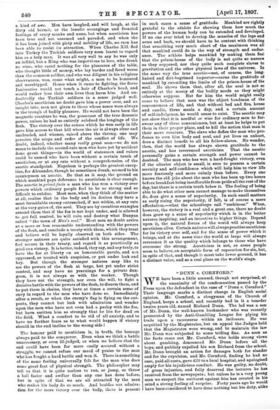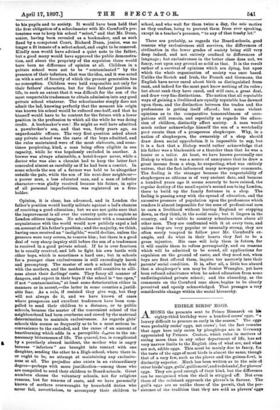" MINN v. CORNFORD."
WE have been a little amused, though not surprised, at the unanimity of the condemnation passed by the Press upon the defendant in the case of "Dunn v. Cornford." Their language marks a distinct change in English social opinion. Mr. Cornford, a clergyman of the Church of England, keeps a school, and recently had in it a boarder twelve years old, named Richard Dunn. The lad was a son of Mr. Dunn, the well-known bookmaker who was recently prosecuted by the Anti-Gambling League for plying his trade upon a racecourse within an inclosure. He was acquitted by the Magistrates, but on appeal the Judges held that the Magistrates were wrong, and to maintain the law Mr. Dunn was subjected to some trifling fine. As soon as the facts came out Mr. Cornford, who holds strong views about gambling, denounced Mr. Dunn before all the boys, and publicly expelled his son Richard from the school. Mr. Dunn brought an action for damages both for slander and for the expulsion, and Mr. Cornford, finding he had no case, paid all costs, gave £20 to a local hospital, and apologised amply for his injudicious conduct. He was guilty, no doubt, of gross injustice, and fully deserved the lectures he has received from the newspapers ; but unless he is a very young man we suspect the outburst against him has created in his mind a strong feeling of surprise. Forty years ago he would have been considered to have done nothing but his duty, alike to his pupils and to society. It would have been held that the first obligation of a schoolmaster with Mr. Cornford's pre- tensions was to keep his school "select," and that Mr. Dunn, senior, having been revealed as a bookmaker, and as such fined by a competent Court, Richard Dunn, junior, was no longer a fit inmate of a select school, and ought to be removed. Kindly men would have advised a quiet note to the father, but a good many would have approved the public demonstra- tion, and about the propriety of the expulsion there would have been no difference of opinion at all. Children in a private school were not to be " contaminated " by the presence of their inferiors, that was the idea, and it was acted on with a sort of ferocity of which the present generation has no conception. Children were held responsible not only for their fathers' characters, but for their fathers' position in life, to such an extent that it was difficult for the son of the most respectable tradesman to obtain admission into any good private school whatever. The schoolmaster simply dare not -admit the lad, knowing perfectly that the moment his origin was known his school would be reduced one-half, and that he himself would have to be content for the future with a lower position in the profession to which all the while he was doing credit. A bookmaker's son ! He might as well have admitted a, pawnbroker's son, and that was, forty years ago, an unpardonable offence. The very first question asked about any private school was the caste of the boys admitted, and the rules maintained were of the most elaborate, and some- times perplexing, kind, a man being often eligible in one capacity, while he was hopelessly excluded in another. A brewer was always admissible, a hotel-keeper never, while a doctor who was also a chemist had to keep the latter fact concealed almost as carefully as if he had been a convict. In some schools the son of a farmer was held to be altogether outside the pale, while the son of his next-door neighbour— a poorer man, a less educated man, and a man of inferior character—was gladly received because his father, in spite of all personal imperfections, was registered as a free- holder.
Opinion, it is clear, has advanced, and in London the father's position would hardly militate against a lad's chances of receiving a good education ; but we are not quite sure that the improvement is all over the country quite so complete as London editors imagine. No schoolmaster with a reasonable acquaintance with the world would now publicly expel a lad on account of his father's position ; and the majority, we think, having once received an " ineligible," would decline, unless the pressure were very severe, to remove him ; but there is a good deal of very sharp inquiry still before the son of a tradesman is received in a good private school. If he is over fourteen he is usually received, and left to fight his own battle with other boys, which is sometimes a hard one ; but in schools for a younger class exclusiveness is still exceedingly harsh and peremptory.. The master of such a school has to deal with the mothers, and the mothers are still sensitive to silli- ness about their darlings' caste. They fancy all manner of dangers, and expect in their boys if the school is " too open," if not " contamination," at least some deterioration either in manners or in accent,—the latter in some counties a, justifi- able fear. As a rule, if resisted they give way, but they will not always do it, and we have known of cases where prosperous and excellent tradesmen have been com- pelled to send their children to a distance, or to public schools, because the master of the convenient school of the neighbourhood had been overborne and cowed by the maternal determination to maintain exclusiveness. As regards girls' schools this occurs so frequently as to be a most serious in- convenience to the excluded, and the cause of an amount of heartburning which adds in a perceptible &a:me to the un- necessary bitternesses of life. The quarrel, too, is complicated by a peculiarly absurd incident, the mother who is angry because "inferiors " are brought into contact with one daughter, sending the other to a High-school, where there is, or ought to be, no attempt at maintaining any exclusive- ness at all. The prejudice also exists in an extraordinary degree—perhaps with more justification—among those who are compelled to send their children to Board-schools. Great numbers choose the voluntary schools, not for religious reasons, but for reasons of caste, and we have personally known of mothers overwrought by household duties who never fail, nevertheless, to accompany their children to
school, and who wait for them twice a day, the sole motive as they confess, being to prevent them from ever speaking, except in a teacher's presence, " to any of that trashy lot."
There are probably, as regards the Board-schools, good reasons why exclusiveness still survives, the differences of civilisation in the lower grades of society being still very deep indeed, and not entirely confined to differences of language ; but exclusiveness in the better ()lass does not, we fancy, rest upon any ground so solid as that. It is the result rather of a survival of opinions which are dying, but upon which the whole organisation of society was once based. Unlike the Scotch and Irish, the French and Germans, the English have never cared about birth as distinguished from rank, and indeed for the most part know nothing of its rules ; but about rank they have cared, and still care, a great deal, and draw very fine distinctions. The notion that all reputable ways of gaining a livelihood are equally reputable has dawned upon them, and the distinction between the trades and the professions is getting itself effaced ; bat some violent opinions as to the comparative honourableness of occu- pations still remain, and especially as regards the educa- tion of children, distinctly affect society. A. man would much rather acknowledge himself the son of a wretchedly poor curate than of a prosperous shopkeeper. Why, in a nation of shopkeepers, the ownership of a shop should draw down social opprobrium it is impossible to say, but it is a fact that a Bishop would rather acknowledge that his father was a blacksmith or a thatcher than that he was a hosier or a tailor. At least, we have known personally one Bishop to whom it was a source of annoyance that he drew a great income from a shop, he suspecting, what was entirely untrue, that the fact influenced many newspaper comments. The feeling is the stranger because the respectability of shopkeepers as citizens is of very ancient date, and because a hundred years ago it seems scarcely to have existed, the regular destiny of the small squire's second son bang London, there to build up the family fortunes in a shop. The feeling is passing away with the spread of education, and the excessive pressure of population upon the professions which renders it almost impossible for the sons of professional men to earn a livelihood without leaving England or stepping down, as they think, in the social scale ; but it lingers in the country, and is visible to country schoolmasters above all other men. They are confronted with it at every turn, and unless they are very popular or unusually strong, they are often sorely tempted to follow poor Mr. Cornford's ex- ample, and do what in their hearts they feel to be a gross injustice. His case will help them in future, for it will enable them to refuse peremptorily, and on reasons which will be admitted to he sound, all applications for expulsion on the ground of caste, and they need not, when boys are first offered them, inquire too narrowly into their parents' social condition. It is, after all, a little too absurd that a shopkeeper's son may be Senior Wrangler, yet have been refused admittance when he asked education from some undistinguished private school; and the absurdity, as the comments on the Cornford case show, begins to be clearly perceived and openly acknowledged. That presages a very considerable change within the social hierarchy.



































 Previous page
Previous page